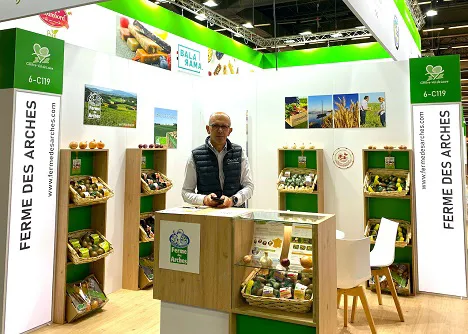Ferme des Arches has just started harvesting spring onions two to three weeks earlier than last year: "We had a very long and dry spring period that required a lot of monitoring in terms of irrigation. We had to be there for the crops. So we started harvesting around May 31 when we started in mid-June the previous season. So far, despite a small partial loss of crop due to hail, the beginning of the campaign is going relatively well. The climatic conditions of this spring have favored an interesting precocity", reports Dominique Viel, sales and marketing director of the company.

Dominique Viel at Natexpo 2021 / © FreshPlaza
Good quality
Concerning the quality, it seems to be very good so far: "On the short days and bulbils, as well as for early varieties, the yellows and the reds have a good aspect with good size. Overall, we are delighted with the start of the new crop campaign. We also feel that the central purchasing agencies are waiting for this new French crop. Now, we are still communicating with distributors to make them aware of the fact that this is an early onion and that we have taken the time to dry it actively. We are therefore adapting our communication during the ordering process to prepare our customers on how to display these products in the store to be in line with the consumption rhythm and the period".
Atypical consumption rhythm
While the demand for onions in May was relatively low, the consumption has been rising for the last ten days: "The demand is dynamic at the start of June, which has not always been the case in the past years. Generally speaking, we find that the pace of consumption today is a bit erratic and disturbed compared to what we were used to seeing in previous years. Are these variations linked to the health crisis? To geopolitical conflicts? To the economic situation influencing purchasing power? Some markers suggest changes in consumption patterns and types of spending.
It remains to be seen if consumption will return to the habits we know today, or if these disruptions will continue over time. What is certain is that the notion of lower purchasing power is important today. It affects the condiment range as well as the whole fruit and vegetable sector as a whole. A fact that is perhaps a little too much emphasized by a media awareness that is sometimes too focused on the increase in fruit and vegetable prices...".
Inflation and AGEC law: a double penalty
A drop in purchasing power contrasts with an increase in production costs, exacerbated by the implementation of the AGEC law: "We are suffering from increased costs such as transport, gas, and electricity, which are high for drying our products. The costs associated with the increase in the price of packaging are much higher, and the AGEC law adds to this economic inflation. We are all the more concerned by this problem since 85% of our products are pre-packaged, with a good part of them being less than 1.5 kg, while there has never been so much consumption of pre-packaged products during the COVID period. We are therefore doubly penalized in this circumstance of inflation and extra cost. The financial health of many companies in the fruit and vegetable sector will be strongly affected. This is why we ask for real support from our distributors. Unfortunately, this is still far from being fully achieved in our sectors. Otherwise, the vegetable production sector, including condiments, will be dependent on world markets, as is the case for the industrial sector today!
In addition to onions, Ferme des Arches currently offers organic and conventional garlic and shallots. After the short-term onions, the company will follow up with bulbils, which will be marketed until the end of August/ before the arrival of the red-yellow onions for storage.
For more information:
Dominique Viel
Ferme des Arches
Tel : 02 37 32 10 10
fermedesarches.com
